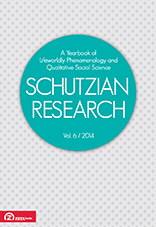心理治療的倫理現場:反面置身的抵達
Psychotherapy as a Locale for Ethical Care:The Reaching into Situated Negativity
Author(s): Wei-Lun Lee Subject(s): Philosophy
Published by: Zeta Books
Keywords: collective life; psychological suffering; negativity; bodily experience;
Summary/Abstract: The aim of this paper is to advance the understanding of psychotherapy as ethical care, a mode of healing practiced in societies rich in the phenomena concerning the operations of collective life. By contemplating and establishing the four concepts: situated negativity, therapeutic locale, bodily experience(in situated negativity), and speech as action, the author is able to delineate the modes of therapeutic interactions right at the locale between the therapist and the patient in order to disclose the structure of interpersonal thwartedness and connectedness within psychotherapy. Viewed in this perspective, psychological suffering is always the suffering of situated negativity. Healing, however, is not to cancel this negativity but to let it become a source of new ways of existence. This reverse of attitude toward negativity involves ways of “talking” into bodily experience in psychotherapy. The meaning of ethical care thus can be described as: what the therapist aims to approach through speech is not positive normative ethics, the socially recognized “should-be,” but the situated negativity which denotes an expelled position from normative interpersonal ordering and which is to be experienced as nameless and full of forces. Situated negativity is not that which to be eliminated but the source to be appreciated by both the therapist and the patient.
Journal: Schutzian Research. A Yearbook of Lifeworldly Phenomenology and Qualitative Social Science
- Issue Year: 2009
- Issue No: Volume 1
- Page Range: 67-83
- Page Count: 17
- Language: Chinese
- Content File-PDF

